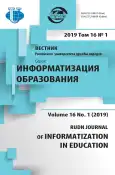Criteria and levels of formation of the logical competence to design mobile computer applications
- Authors: Nurbekova Z.K.1, Aimicheva G.I.1
-
Affiliations:
- L.N. Gumilyov Eurasian National University
- Issue: Vol 16, No 1 (2019)
- Pages: 81-88
- Section: COMPUTER SCIENCE TEACHING
- URL: https://journal-vniispk.ru/2312-8631/article/view/333492
- DOI: https://doi.org/10.22363/2312-8631-2019-16-1-81-88
- ID: 333492
Cite item
Full Text
Abstract
Problem and goal. The article deals with the problem of formation of logical competence in the design of mobile applications for future teachers of informatics. From the position of the competence approach in the structure of logical competence in the design of mobile applications are allocated motivational, cognitive, activity, communicative, reflexive components. Special attention is paid to the criteria and levels of formation of logical competence of future teachers of informatics in the design of mobile applications. Methodology. To diagnose the degree of formation of logical competence in the design of mobile applications are three levels: reproductive, productive and creative. Results. Five criteria aimed at determining the degree of understanding and application of the logical-algebraic apparatus in the development of mobile applications, generating new knowledge based on the experience and the possibility of applying the experience in the professional field are formulated. The article provides an example of determining the degree of formation of logical competence for the design of mobile applications. Conclusion. Reproductive and productive levels demonstrate the ability of students to design mobile applications based on a ready-made template or instructions. Creative level is the highest level of formation of logical competence of the student, indicating the ability to create mobile applications at a professional level on the basis of experience.
About the authors
Zhanat Kunapianovna Nurbekova
L.N. Gumilyov Eurasian National University
Author for correspondence.
Email: zhanat_n@mail.ru
doctor of pedagogical sciences, full professor, dean of the faculty of information technologies
2 Satpayev St., Astana, 010008, Republic of KazakhstanGaukhar Islyamovna Aimicheva
L.N. Gumilyov Eurasian National University
Email: aimicheva@mail.ru
PhD student of the computer science department
2 Satpayev St., Astana, 010008, Republic of KazakhstanReferences
- Grigoriev S.G., Grinshkun V.V., Remorenko I.M. “Umnaya auditoriya”: ot integracii tekhnologij k integracii principov [“Smart audience”: from the integration of technologies to integrate the principles of]. Informatika i obrazovanie [Informatics and education]. 2013. No. 10. Pp. 3—8.
- Grinshkun V.V., Remorenko I.M. Frontiry “Moskovskoj ehlektronnoj shkoly” [Frontiers of “Moscow electronic school”]. Informatika i obrazovanie [Informatics and education]. 2017. No. 7. Pp. 3—8.
- Dejkstra Eh. Disciplina programmirovaniya [Discipline of programming]. M.: Mir, 1978. 275 p.
- Mirzoev M.S. Teoretiko-metodicheskie osnovaniya formirovaniya matematicheskoj kul’tury uchitelya informatiki [Theoretical and methodical bases of formation of mathematical culture of the teacher of informatics]: monografiya. M.: Prometej, 2015. 306 p.
- Molly M., Kim T., David M. Swift 3: razrabotka prilozhenij v srede Xcode dlya iPhone i iPad s ispol’zovaniem iOS SDK [Swift 3: develop applications in Xcode environment for iPhone and iPad using iOS SDK]. M.: Williams, 2017. 898 p.
- Nahavandipur V. Razrabotka prilozhenij dlya iPhone, iPAD i iPOD [Application development for iPhone, iPAD and iPOD]. SPb.: Piter, 2013. 861 p.
- Nurbekova Zh.K. Teoretiko-metodologicheskie osnovy obucheniya programmirovaniyu [Theoretical and methodological foundations of teaching programming]: monografiya. Pavlodar: PGU im. S. Torajgyrova, 2004. 225 p.
- Pupyshev V.V., Kupchinaus S.Yu. O konstruktivno-logicheskoj kompetentnosti v programmirovanii [On structurally-logical competence in programming]. Sovremennye informacionnye tekhnologii v obrazovanii i nauchnyh issledovaniyah [Modern information technologies in education and scientific research]. 2013. Pp. 149—153.
- Hat’ko E.E. Issledovanie i razrabotka metoda, modelej i algoritmov testirovaniya prilozhenij dlya mobil’nyh ustrojstv [Research and development of method, models and algorithms for testing applications for mobile devices]: dis.. kand. tekhn. nauk. M., 2013. 169 p.
- Hutorskoj A.V. Kompetencii v obrazovanii: opyt proektirovaniya [In education: experience in designing]. M.: INEHK, 2007. Pp. 327—327.
- Cejtin G.S. O professionalizme v programmirovanii [About professionalism in programming]. SPb.: LGU, 1989. 204 p.
- Bloom B.S. Taxonomy of educational objectives. New York: McKay, 1956.
- Computer Science Curricula 2013. December 20, 2013. Association for Computing Machinery (ACM).
- Dodero Beardo J.M., Mota J.M., Ruiz-Rube I. Bringing computational thinking to teachers’ training: a workshop review. Proceedings of the 5th International Conference on Technological Ecosystems for Enhancing Multiculturality. ACM, 2017. P. 4.
- Sykes E.R. New methods of mobile computing: From smartpfones to smart education. TechTrends. 2014. Vol. 58. No. 3. Pp. 26—37.
Supplementary files









